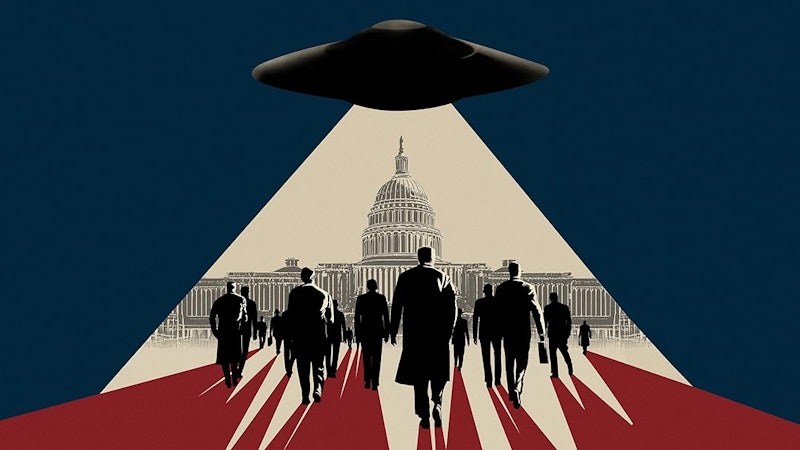The Age of Disclosure, a documentary about UAP (unidentified anomalous phenomena, previously known as UFOs) and government efforts to cover them up, is claptrap. The film treats tenuously connected ideas as if they’re all one explosive secret. Extensive interviews of current or former government employees show some saying there are alien bodies (“biologics”) and technology in the custody of government agencies or defense contractors; while others make cogent, but independent, points that we don’t have explanations for some UAP, the government’s been too secretive about them, and our national security would be harmed if Russia and China get a technological jump on us.
Where’s the evidence for alien bodies and technology? The Age of Disclosure offers only the words of people saying they’re aware of such evidence, and are putting themselves at risk by going public, since dark forces want to keep it under wraps; what these people have seen stays vague, some noting it’s “classified.” There are other interviewees, including elected officials, saying they want more information about what’s going on. Some of the latter also discuss the possibility that “we’re not alone in the universe,” without reference to whether aliens are visiting Earth. The compilation of clips conveys an impression that the people in the second group believe claims made by the first group, such as that “biologics” have been retrieved from the crashed alien vessels, but they’re never asked if they do.
There’s no doubt that government entities have misled the public about extraterrestrials. Notably, though, what’s come to light is a conspiracy aimed at the opposite goal from that indicated in The Age of Disclosure—deliberately stirring up public belief in alien encounters, to divert attention from secret military programs that had nothing to do with aliens. In June, The Wall Street Journal reported on decades-long efforts to propagate false documents and spread UFO mythology, like when a colonel brought images of apparent flying saucers to a bar near Area 51, the Nevada testing site for weapons programs, in the 1980s: “Military leaders were worried that the programs might get exposed if locals somehow glimpsed a test flight of, say, the F-117 stealth fighter, an aircraft that truly did look out of this world. Better that they believe it came from Andromeda.”
Skeptics have wondered how extraterrestrials who’ve the ability to navigate interstellar space could incompetently crash on Earth; more skepticism is why, despite the proliferation of smartphones and surveillance cameras, imagery of purported spaceships remains limited and low-quality. In The Age of Disclosure, physicist Hal Puthoff suggests that seeming accidents may be deliberate efforts by aliens to distribute technology or provide an extensive “IQ test” for humans. Puthoff argues the aliens may travel in “spacetime bubbles,” such that photography of their vessels will be inherently grainy; he also suggests the visitors might be interdimensional beings or time travelers. Yet if we’re dealing with entities so inscrutable, even a massive release of government files may not be enough to confirm their existence or clarify what they want if they’re here.
My dissatisfaction with The Age of Disclosure was amplified by the film’s contrast, in evidentiary standards and intellectual coherence, with a documentary on an unrelated topic I’d watched a few days earlier. This was The Bibi Files, which builds a strong case against Israeli prime minister Benjamin Netanyahu as a corrupt and unethical leader, drawing heavily on leaked videos of police interrogations of Netanyahu and others. The testimony provides clear reason to believe that the prime minister and his wife received improper gifts in exchange for favors. The film persuasively interweaves this evident corruption with Netanyahu’s decision-making on matters ranging from building a coalition with the far-right, to pushing a reform that would weaken the judiciary, to conducting the war in Gaza, all seemingly shaped by a priority of staying in power to avoid prison.

